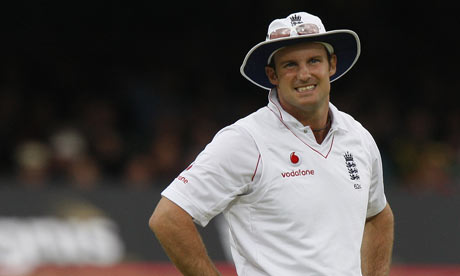
A fancy declaration has unnecessarily jeopardised England's series. It could yet lead to a defeat that would knock the stuffing out of them


England's captain Andrew Strauss shows his frustration after a chance goes begging on the fourth day of the second Test at Lord's. Photograph: Kirsty Wigglesworth/AP
It is easy to be wise after events but at 11.15am a note of bewilderment was made at the news of England's declaration: "If no follow-on, put them out of the game."
Once the option of the follow-on had been rejected on Saturday, presumably on the basis that England could lose the Test by having to bat last, the logical step for Andrew Strauss was to allow his side to continue batting until the game was absolutely safe: to score so many runs that, even if the Australians, on an excellent surface, were still there at the close of play on Monday, they would not have enough runs to win, to leave them batting without hope of victory.
Andrew Strauss declined this route. As a consequence we are back in Adelaide 2006 territory: a fancy declaration has unnecessarily jeopardised England's series. It could yet lead to a defeat that would knock the stuffing out of any team. England escaped with an amazing draw at Cardiff but defeat here would overhaul that result on the gobsmackometer by a margin that would have Peter Snow breaking the high jump record. The equation still favours England: 209 more runs are required by Australia with five wickets standing but now nothing can be guaranteed.
So far Michael Clarke and Brad Haddin have added 185 together with barely a glitch. This evening Andrew Flintoff was charging in with the new ball like a wounded bull and there was an air of desperation about England. Strauss' summoning of his team for an impromptu huddle just before taking the new ball was an indication of their state of mind.
England may be all right with an early wicket tomorrow but there will be palms drenched in sweat in the morning all around Lord's. Strauss talked about the importance of his team being more ruthless before the series; the need to finish off opponents. Yet he has not listened to his own propaganda. In this instance that would have entailed batting Australia right out of the game before trying to take their wickets.
If Australia were to win tomorrow, England will cling to the history books for justification of their declaration. No side has ever come anywhere near 522 for victory in a Test match, 418 by West Indies against Australia at St John's in Antigua is currently the highest. But in cricket it is safer to adopt the Henry Ford mantra, to treat history as bunk, and to play the conditions, which at Lord's means another sublime batting surface and a lightning fast outfield.
It may be that Strauss has mistaken ruthlessness for bullishness. The England camp are not immune from criticism and there was a lot thrown in their direction in the Caribbean for the conservative nature of their declarations when England needed to win to square the series. Maybe those criticisms were valid but different rules apply now. It is the start of a series and the opponents are Australia.
Moreover the game in the 21st century is changing faster than at any time in its history. Pitches no longer deteriorate, which makes the reluctance to enforce the follow-on all the more puzzling, and batsmen are no longer constrained by any parameters. In part this is because of the pitches. It is also a consequence of Twenty20 cricket. Batsmen now believe anything is possible.
In Chennai last winter India knocked off 387 in just over a day against England, scarcely blinking in the process. Earlier this summer down at county level Somerset sprinted to 479 in 85.3 overs to beat Yorkshire with four wickets and four overs to spare. Old verities no longer apply.
Strauss's declaration has set up a pulsating final day. As well as Adelaide 2006 there are echoes of Edgbaston 2005 here. Tomorrow all four results are possible. There should be only two.
Want To Play bingo game








No comments:
Post a Comment